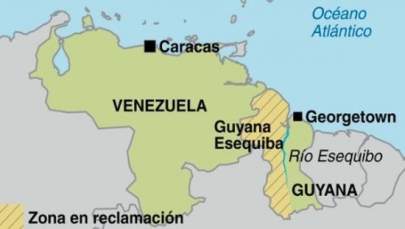War in Latin America?
December 4th, 2023
Venezuela
ASCF Sr. Analyst, Laurence Sanford

photo credit: geografiaopinativa.com.br
Venezuela, a dystopian socialist nightmare, is beating the drums of war over a territorial border dispute with neighboring Guyana. The drumbeats are similar to Russia’s Vladimir Putin’s drumbeats against Ukraine prior to the invasion and China’s Xi Jinping's drumbeat on regaining territories in Taiwan, Japan, India, and Russia and controlling the South China Sea.
On December 3, 2023, a referendum in Venezuela was voted on to annex Guyana’s Esequiba region. The drumbeat for annexation coincides with the discovery of millions of barrels of oil off the Guyanan coast.
The Guyana Esequiba region was formerly under the control of the Spanish, Dutch, and British empires. Under the Spanish empire, the Esequiba region was part of Venezuela. In 1899, international arbitrators established the present-day boundaries between Venezuela, the then-colony British Guinea, and now present-day Guyana. Venezuela now disputes the agreement and is using the referendum as an excuse to distract the population from its misery and to gain control over billions of oil barrels developed by the American Exxon Mobil oil company.
Socialist, anti-American autocrat Nicolas Maduro rules Venezuela. He succeeded Marxist anti-American autocrat Hugo Chavez, who ruled from 1999 until his death from cancer in 2013. The combined years of their socialist rule have impoverished once-prosperous Venezuela, even though it has the largest oil reserves in the world.
An estimated 7.3 million Venezuelans have fled the country since 2014 due to rampant crime, inflation, political repression, and shortages of food, medicine, electricity, and employment opportunities. Two thousand flee every day, with an estimated 500,000 now living in the United States.
China, along with Russia and Iran, prop up the Marxist Maduro regime. China alone has lent Venezuela over $60 billion, backed by oil sales. Venezuela is China’s fourth largest source of petroleum products.
Russia and Iran provide Venezuela with military and security aid. The sophisticated deployment of security equipment and techniques aids the political repression of Maduro’s opponents.
The Chinese Communist Party’s (CCP) technologies of national digital ID cards, fingerprint authentication, and facial recognition cameras to track and suppress its citizens are now used in Venezuela. Every Venezuelan citizen is issued a Homeland Card with a unique QR code that contains identity, biographical information, and social credit information. The cards are used for social control and election influence and are critical for the regime’s survival.
In September 2023, Maduro visited China and signed bilateral cooperation agreements.
China followed this by upgrading relations to an “all-weather strategic partnership.” The meeting is eerily similar to Putin’s visit to China just before the Ukraine invasion, where Putin and Xi signed a “limitless” partnership agreement.
Guyana is a small country with a population of less than one million. Forty percent are Indian heritage, and thirty percent are of African heritage. The remaining thirty percent is divided among people of indigenous and European heritage. It is the only English-speaking nation in South America. The Esequiba region, which Venezuela claims, is the size of Florida and is two-thirds of Guyana’s land mass. It is sparsely populated, primarily with indigenous people.
Exxon and its partners, Hess and CNOOC (China National Offshore Oil Corporation), have discovered over 11 billion barrels of oil and gas offshore in Guyana. It is the largest new oil field in the world. The infusion of wealth into this small country is causing social friction and cries of environmental degradation.
Summary
Venezuela is a South American base for Chinese, Russian, and Iranian operations against democracy in Latin America and the United States. Being a Marxist socialist state, it has impoverished its people both materially and spiritually.
The “enemy of my enemy is my friend.” Venezuela, China, Russia, and Iran are friends because they are enemies of the United States.
Action
Recognize Venezuela is not a friend of the United States and Western Civilization.
● Work with international organizations such as the Organization of American States (OAS) in promoting human rights, election integrity, and regional harmony. Often, it is difficult for OAS to have a unified message on democracy since membership includes autocratic Venezuela, Nicaragua, and Bolivia. Cuba is not a member of OAS.
● Increase “gray zone” non-military operations to support democracy.
● Seek regime change in Venezuela.
● Remove sanctions against Cuba and Venezuela. Sanctions project the image of the U.S. being a bully. Furthermore, sanctions do not work. Cuba, 60-plus years after sanctions were put in place, is still ruled by a repressive Marxist government that blames its poverty on the U.S. sanctions.
● Invest in the American military. Without a “big stick,” speaking softly has no significance.
Peace Through Strength!
Laurence F. Sanford
Senior Analyst
American Security Council Foundation
www.ascf.us
Author Laurence F. Sanford is a veteran of the United States Navy and the Central Intelligence Agency (CIA). If you liked this article, please share it with your friends and family. You can also help the American Security Council Foundation shape American policy by donating at https://www.ascf.us/donate/











